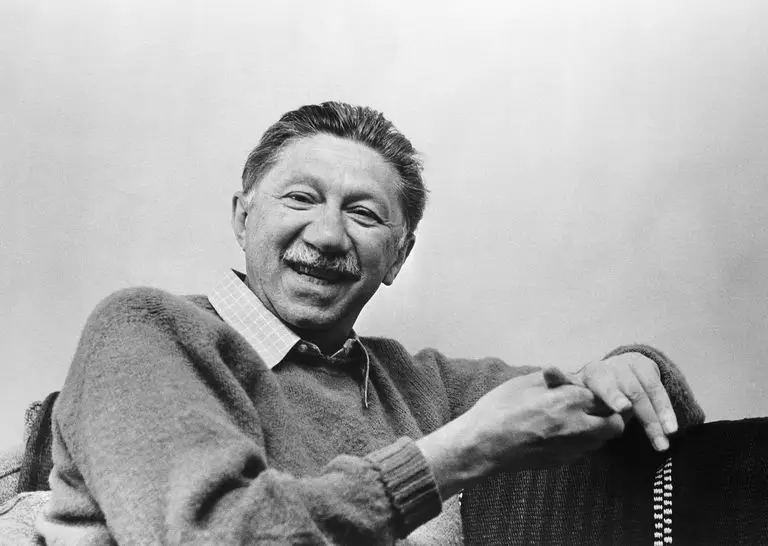Abraham Maslow – Les Cinq Niveaux de la Hiérarchie des Besoins

Abraham Maslow était un professeur de psychologie Américain, il a créé la hiérarchie des besoins de Maslow. Il a souligné qu’il était plus important de se concentrer sur les aspects positifs qui caractérisent une personne que de s’intéresser uniquement à ses symptômes.
Les recherches menées par Maslow concernaient principalement la santé mentale et le potentiel humain. Il a consacré de nombreux textes à ce sujet, notamment aux concepts de la hiérarchie des besoins, aux méta-besoins, à la méta-motivation, à l’accomplissement de soi et aux expériences paroxystiques. [1].
Il a également été Président de l’Association Américaine de Psychologie de 1967 à 1968. Il est l’auteur de plus d’une vingtaine d’ouvrages, notamment Etre Humain: La Nature Humaine et sa Plénitude, L’Accomplissement de Soi: de la Motivation à la Plénitude, Devenir le Meilleur de Soi-Même : Besoins Fondamentaux, Motivation et Personnalité. Ses travaux restent une référence pour de nombreux psychologues et étudiants du monde entier.
Hiérarchie des besoins de Maslow

Définition de la Estime de Soi selon Abraham Maslow
Le besoin associé à l’estime supérieure est indissociable des besoins liés au respect de soi, à l’estime de soi, à la réussite, à l’indépendance, à la liberté, etc. Le niveau d’estime inférieure représente le besoin de gagner le respect d’autrui, le besoin de reconnaissance, de célébrité, de gloire, d’attention, de réputation, etc. Maslow identifiait l’aspect négatif de ce besoin au manque de confiance en soi et aux complexes d’infériorité qui constituent la cause de la plupart des troubles psychologiques.
Certaines personnes sont prêtes à tout pour devenir célèbres. Certaines personnes sont prêtes à tout faire pour être aimées par l’élu(e) de leur cœur. Certaines personnes sont prêtes à tout et même à commettre des crimes pour pouvoir nourrir leur famille.
Certaines personnes sont prêtes à changer de vie pour préserver leur sécurité. Certaines personnes apprécient tout simplement la vie qu’elles mènent et elles continuent de vivre, en appréciant tout autant leur voyage que leur destination. Ces personnes représentent les cinq niveaux de la hiérarchie des besoins de Maslow qui a été établie par Abraham Maslow en 1943.
La hiérarchie des besoins, généralement représentée par une pyramide, indique le classement des besoins que les gens doivent satisfaire au cours de leur vie. Elle est fondée sur un principe spécifique qui se situe au plus haut niveau de la hiérarchie : “Ce qu’un homme peut être, il doit l’être.”
Les cinq niveaux de la hiérarchie des besoins d’Abraham Maslow (2) sont classés ci-dessous, du plus bas au plus élevé:
Besoins Physiologiques
Les besoins physiologiques incluent les besoins fondamentaux (1) que l’homme doit satisfaire pour survivre, notamment se nourrir, se vêtir, s’abriter ainsi que les processus homéostatiques comme l’excrétion. Les personnes qui sont prêtes à tout pour nourrir leur famille représentent parfaitement les personnes qui se situent à ce niveau. Ces personnes sont prêtes à renoncer à leurs rêves, à leur sécurité et à leur liberté (notamment en commettant des actes criminels) afin d’obtenir de la nourriture. Lorsque les besoins physiologiques sont satisfaits, la personne concernée peut passer au niveau suivant qui concerne le besoin de sécurité.
Besoins de Sécurité
Lorsque les besoins consacrés à l’entretien du corps ont été satisfaits, le besoin de sécurité devient une priorité. Les besoins de sécurité peuvent prendre différentes formes et ils peuvent notamment concerner le besoin de sécurité personnelle. Ce besoin nous incite à nous préserver de la violence physique, notamment de la guerre et de la violence domestique. Le besoin de sécurité financière, qu’il n’est plus nécessaire d’expliquer car vous avez accès à internet, appartient également à cette catégorie de besoins.
Besoins d’Amour/d’Appartenance
Lorsqu’une personne se sent en sécurité, il ou elle ressentira le besoin d’être aimé(e) et accepté(e) par les autres. Ce besoin se manifeste sous deux aspects différents : sexuel et non-sexuel. Les personnes qui ne parviennent pas à fonctionner efficacement lorsqu’elles se sentent rejetées par leurs amis ou par des personnes qui étaient malheureuses en amour représentent parfaitement cette catégorie de besoins. Lorsqu’une personne parvient à satisfaire ses besoins d’amour et d’appartenance, elle est beaucoup plus épanouie et motivée et elle peut passer au niveau suivant.
Besoins d’Estime
Lors de cette étape, les gens cherchent à satisfaire des besoins qui concernent le respect de soi et la confiance en soi au lieu de se concentrer uniquement sur les besoins associés à l’amour et à l’appartenance. Cette tâche peut être effectuée en recherchant la célébrité et la gloire, ce que Maslow décrit comme la version inférieure. La version supérieure est celle qui se concentre davantage sur la vie intérieure, notamment sur les besoins de force, de maîtrise de soi et de respect de soi.
Tout le monde sait qu’il est primordial de se sentir respecté(e) et qu’il est important que nos réussites, quelles qu’elles soient, soient reconnues. L’un des raisons les plus nobles qui nous incite à rejoindre une équipe sportive ou un club d’art est le désir d’accomplir une tâche du mieux possible. En tentant de satisfaire ce désir, nous exprimons un besoin d’être reconnu(e) et d’obtenir le statut correspondant à notre rôle au sein de l’équipe.
Estime Inférieure
La théorie de Maslow indique qu’il existe deux niveaux d’estime. L’estime inférieure est associée au besoin de gagner le respect d’autrui. Il s’agit d’un besoin d’attention, d’un désir de célébrité, de reconnaissance et d’une attirance pour le prestige. Ce trait caractérise fréquemment les jeunes gens qui veulent chanter dans les bars Karaoké et participer à des spectacles d’artistes amateurs, ainsi que les sportifs talentueux qui pensent que leurs compétences et leurs aptitudes supassent celles de leurs coéquipiers.
Estime Supérieure
Le respect de soi est indispensable. Le respect de soi nous incite à lutter pour paraître confiant(e), indépendant(e) et libre tout en disposant d’une aptitude qui nous permet de prendre en main notre propre destin. Cependant, les deux niveaux d’estime ne sont pas indépendants, mais plutôt intimement liés.

Besoins d’Accomplissement de Soi
Il s’agit des quatre “besoins de privation” qui devaient être satisfaits selon les cinq niveaux de la hiérarchie des besoins de Maslow. Ils portent cette appellation car ils sont satisfaits par l’absence du manque qu’ils créent. Et lorsqu’une personne n’est plus privée de ces quatre besoins, elle est prête à satisfaire le “besoin de croissance,” associé au niveau supérieur. Il est question d’un besoin d’auto-accomplissement ou du besoin de devenir ce que l’on peut devenir, peu importe ce dont il s’agit.
Cette section inclut les objectifs les plus ambitieux de la pyramide que Maslow a défini comme étant le niveau supérieur de sa théorie de la motivation humaine. La hiérarchie des besoins qui vous permet de lutter pour devenir ce que vous pouvez être.
Réaliser son potentiel: cet objectif peut être atteint en peignant un tableau qui est vendu dans une galerie à un prix élevé, en apprenant une nouvelle langue, en atteignant un très bon niveau au violon ou en obtenant un diplôme de biochimie.
Maslow a affirmé que nous devons d’abord gravir les niveaux inférieurs de la pyramide pour s’épanouir sur le plan personnel. Ainsi, nos besoins physiologiques sont satisfaits, nous nous sentons en sécurité, à l’abri et nous maîtrisons notre statut social. Nous devons également maîtriser nos niveaux d’estime (inférieure et supérieure) et lorsque cet objectif est atteint, il ne nous reste plus qu’à utiliser et développer nos aptitudes, à réaliser nos rêves (que nous devons d’abord créer) et à souhaiter progresser et réussir.
[3]Le professeur émérite de psychologie de l’Université de l’Illinois, Ed Diener, qui est également chercheur principal à la Gallup Organization, a constaté que la satisfaction des besoins fondamentaux amène les gens à se placer plus haut sur une échelle de satisfaction de la vie, tout en poursuivant des besoins sociaux et de réalisation plus élevés. est plus étroitement associée à des sentiments positifs et à profiter de la vie, même lorsque les besoins de base font défaut.
Transcendance
Maslow a apporté des modifications mineures à son modèle. Selon lui, il existe un niveau de développement supérieur, qu’il définit comme la transcendance de soi.
Il s’agit du désir de faire avancer une cause qui nous dépasse, d’adopter un mode de vie altruiste ou spirituel. Ce niveau se situe au-dessus du sommet de la pyramide de Maslow et il concerne probablement les plus grandes questions de l’humanité. Quel est le but de la vie ? L’infini existe-t-il ? Que devient notre âme après la mort?
Citations d’Abraham Maslow
• Si nous souhaitons aider les humains à se comporter de manière encore plus humaine, nous devons réaliser qu’ils tentent de comprendre leur propre mode de fonctionnement et qu’ils sont également peu disposés, effrayés ou même dans l’incapacité d’effectuer cette démarche. Ce n’est qu’en mesurant pleinement le rapport dialectique existant entre la maladie et la santé que nous parviendrons à faire pencher la balance en faveur de la santé.
- “L’observation de personnes épanouies sur le plan personnel peut nous en apprendre beaucoup sur nos erreurs, nos defaults et sur les caractéristiques positives que nous devons développer”.
- “Les difficultés, les conflits, la culpabilité, la mauvaise conscience, l’anxiété, la dépression, la frustration, le stress, la honte, l’autopunition et le sentiment d’indignité peuvent tous provoquer des troubles; ces facteurs affectent notre fonctionnement et ils sont incontrôlables “.
- “Les personnes épanouies, celles qui ont atteint un niveau élevé de maturité, de santé et d’accomplissement, ont tant à nous apprendre qu’elles semblent parfois appartenir à une autre race d’êtres humains.”
Extraits
Vers une Psychologie de l’Etre
Le concept de “besoin fondamental” peut être défini en fonction des questions auxquelles il répond et des interventions qui le révèle. Mes questions initiales concernaient la psycho-pathogénèse. Quelle est la source des névroses ? Ma réponse indiquait, en résumé, que la névrose semble essentiellement être une maladie déficitaire, qui apparait suite à la privation de certaines satisfactions que je considère comme des besoins, qui sont tout aussi indispensables que les acides aminés et le calcium, notamment parce que leur absence provoque des maladies. La plupart des névroses concernent des besoins insatisfaits liés à la sécurité, à l’appartenance, à l’identification, aux relations amoureuses, au respect et au prestige ainsi que d’autres facteurs déterminants. Extrait de Vers une Psychologie de l’Etre (page 27).
Chaque être humain dispose de deux types de forces. L’une de ces forces se raccroche à la sécurité et à une attitude défensive due à la peur, elle nous incite à régresser, à s’accrocher au passé et à redouter de s’éloigner de la communication primitive avec l’utérus et le sein de la mère, à avoir peur de saisir des opportunités, à craindre de perdre ce que nous possédons déjà, à redouter l’indépendance, la liberté et la différence. L’autre force nous incite à progresser vers la complétude du Soi et l’unicité du soi, vers le parfait fonctionnement de toutes nos aptitudes, à faire preuve d’assurance face au monde extérieur tout en acceptant la complexité et l’intégralité de notre inconscient. Extrait de Vers une Psychologie de l’Etre (page 55).
Références
1. (1943). A Theory of Human Motivation. Psychological Review,
2. (1962). Toward a Psychology of being. Princeton: D. Van Nostrand Company
3. https://news.illinois.edu/view/6367/205291




